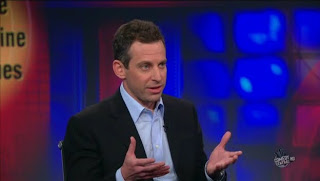Philosophy
 Whatever its perceived weaknesses (and the critics have been relentless on some technical points), Sam Harris' recent book, The Moral Landscape, has recently reinvigorated the discussion concerning the objectivity of moral values and obligations. To religious people, the answer seems obvious: if moral values are to count as objectively binding, they must be grounded in God's commands. After all, morality comes from God, doesn't it?
Whatever its perceived weaknesses (and the critics have been relentless on some technical points), Sam Harris' recent book, The Moral Landscape, has recently reinvigorated the discussion concerning the objectivity of moral values and obligations. To religious people, the answer seems obvious: if moral values are to count as objectively binding, they must be grounded in God's commands. After all, morality comes from God, doesn't it?
Philosophers since the time of Socrates have rejected this approach (known as divine command theory) on the grounds that, in the absence of any independent set of reasons, God's commands would turn out to be completely arbitrary, and hence objective perhaps -whatever that means- but certainly not moral.
 The difficulty most philosophers have had upon such a realization, however, has been with figuring out what might be able to count as a positive objective standard for moral values. Sam Harris thinks that moral values can be grounded in science. William Lane Craig thinks moral values can only come from God. A fascinating and perplexing debate ensues in which Craig accuses Harris of defining morality into a tautology, while Harris accuses Craig of doing exactly the same thing. And they're both right. Go confirmation bias!
The difficulty most philosophers have had upon such a realization, however, has been with figuring out what might be able to count as a positive objective standard for moral values. Sam Harris thinks that moral values can be grounded in science. William Lane Craig thinks moral values can only come from God. A fascinating and perplexing debate ensues in which Craig accuses Harris of defining morality into a tautology, while Harris accuses Craig of doing exactly the same thing. And they're both right. Go confirmation bias!
Now, while the discussion below provides lots of great food for thought worth pondering, it seems to me that by defining morality in their own particular ways (a move that's ultimately inescapable), both philosophers were probably preaching to their respective choirs, and that the chances either of them might have gained new supporters who didn't already agree with their take on the issue are probably nil.
I'd say the debate was very interesting, and even though I tend to lean more in Harris' direction, I'm not sure either speaker won the day on the basis of the relevant arguments alone...
Both managed to undermine each other's position rather well, but neither managed to overcome such blows once they were dealt, and both were more than happy to go off on tangents irrelevant to the main point of discussion while still managing to provide thought-provoking arguments.
- Whatdayathink?
I try not to make this blog about me, but today I'm going to indulge a bit and ask your opinion on something. I started this blog at the time I was writing a manuscript for a pop ethics/politics book designed to respond to the then common notion...
- Sam Harris On Free Will
The religious instinct is not merely limited to belief in God and supernatural agents. And to varying degrees, even hard-core atheists tend to be religious in this sense, since they still adopt beliefs that may be religious in origin. It's a little...
- Has Dilbert Refuted Sam Harris?
You've probably seen Sam Harris argue that science can answer moral questions because science deals with facts and values are a sort of fact (logic buffs should see straight through the problems with this argument). Lots of thinkers have weighed in...
- Moral Philosophy Hits Late Night Tv
I've always liked Craig Ferguson. He strikes me not only as a funny dude but also as a decent human being, and my admiration for him has just grown since he decided to invite to his show a professional philosopher, Jonathan Dancy, to discuss the nature...
- Sam Harris - Science Can Answer Moral Questions
Because of our long history of conquest, imperialism and xenophobia, we in the West have learned the hard way (though only as perpetrators) that we can't simply assume, and consequently impose, our beliefs and values on societies whose worldview differ...
Philosophy
Sam Harris vs. William Lane Craig - Where Do Objective Moral Values Come From?
 Whatever its perceived weaknesses (and the critics have been relentless on some technical points), Sam Harris' recent book, The Moral Landscape, has recently reinvigorated the discussion concerning the objectivity of moral values and obligations. To religious people, the answer seems obvious: if moral values are to count as objectively binding, they must be grounded in God's commands. After all, morality comes from God, doesn't it?
Whatever its perceived weaknesses (and the critics have been relentless on some technical points), Sam Harris' recent book, The Moral Landscape, has recently reinvigorated the discussion concerning the objectivity of moral values and obligations. To religious people, the answer seems obvious: if moral values are to count as objectively binding, they must be grounded in God's commands. After all, morality comes from God, doesn't it?Philosophers since the time of Socrates have rejected this approach (known as divine command theory) on the grounds that, in the absence of any independent set of reasons, God's commands would turn out to be completely arbitrary, and hence objective perhaps -whatever that means- but certainly not moral.

Now, while the discussion below provides lots of great food for thought worth pondering, it seems to me that by defining morality in their own particular ways (a move that's ultimately inescapable), both philosophers were probably preaching to their respective choirs, and that the chances either of them might have gained new supporters who didn't already agree with their take on the issue are probably nil.
I'd say the debate was very interesting, and even though I tend to lean more in Harris' direction, I'm not sure either speaker won the day on the basis of the relevant arguments alone...
Both managed to undermine each other's position rather well, but neither managed to overcome such blows once they were dealt, and both were more than happy to go off on tangents irrelevant to the main point of discussion while still managing to provide thought-provoking arguments.
I'd declare the debate a draw, with both participants seriously injured by the other. Perhaps it was an act of martyrdom undertaken for our sake :)
I'll be posting more interesting talks on this topic soon, but in the meantime, here is philosopher Peter Singer with some thoughts on the subject.
.
- Whatdayathink?
I try not to make this blog about me, but today I'm going to indulge a bit and ask your opinion on something. I started this blog at the time I was writing a manuscript for a pop ethics/politics book designed to respond to the then common notion...
- Sam Harris On Free Will
The religious instinct is not merely limited to belief in God and supernatural agents. And to varying degrees, even hard-core atheists tend to be religious in this sense, since they still adopt beliefs that may be religious in origin. It's a little...
- Has Dilbert Refuted Sam Harris?
You've probably seen Sam Harris argue that science can answer moral questions because science deals with facts and values are a sort of fact (logic buffs should see straight through the problems with this argument). Lots of thinkers have weighed in...
- Moral Philosophy Hits Late Night Tv
I've always liked Craig Ferguson. He strikes me not only as a funny dude but also as a decent human being, and my admiration for him has just grown since he decided to invite to his show a professional philosopher, Jonathan Dancy, to discuss the nature...
- Sam Harris - Science Can Answer Moral Questions
Because of our long history of conquest, imperialism and xenophobia, we in the West have learned the hard way (though only as perpetrators) that we can't simply assume, and consequently impose, our beliefs and values on societies whose worldview differ...
